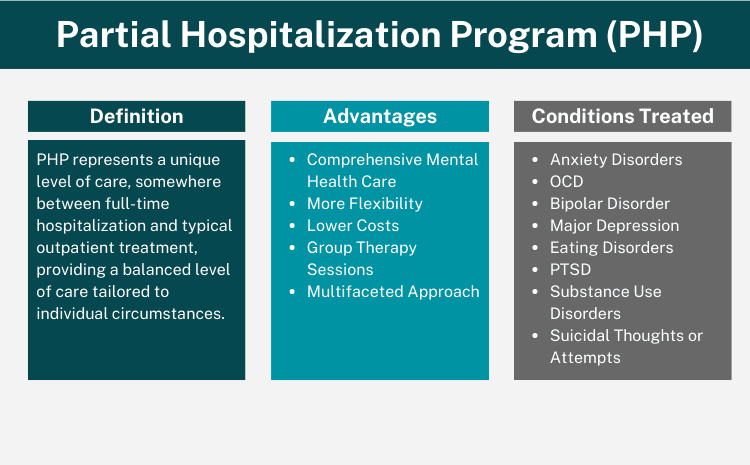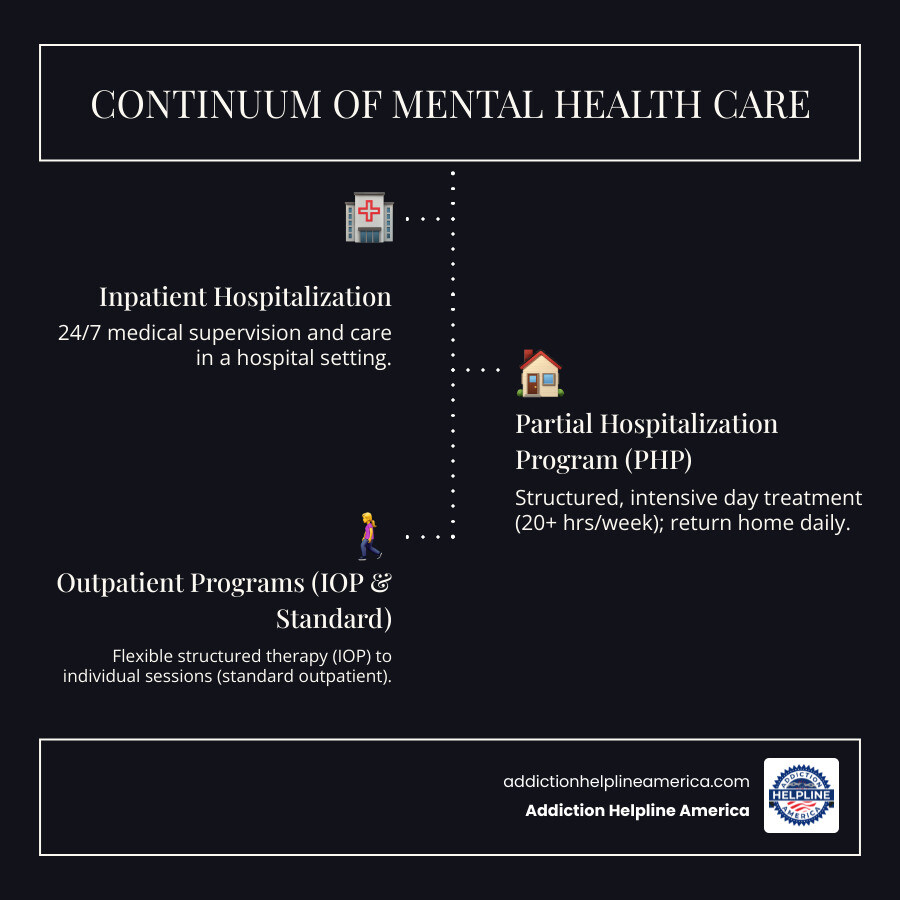
What You Need to Know About Partial Hospitalization Programs
Partial hospitalization programs (PHPs) are structured, intensive treatment programs for mental health and addiction that you attend during the day, returning home each evening. They bridge the gap between 24/7 inpatient care and traditional weekly therapy, offering a high level of support without full hospitalization.
Quick Facts:
- Treatment Hours: 20+ hours per week, typically 5-7 days
- Daily Schedule: 4-8 hours of therapy and treatment per day
- Living Situation: You live at home and commute daily
- Supervision: Medical staff available during program hours (no overnight)
- Ideal For: Those who need intensive support but don’t require 24/7 monitoring
- Common Conditions: Substance use disorders, depression, bipolar disorder, anxiety, eating disorders
When weekly therapy isn’t enough but inpatient care feels too extreme, PHPs provide a vital middle ground. They offer the same intensity of care as a hospital—individual and group therapy, medication management, and crisis support—with the flexibility to sleep in your own bed. Research shows PHPs can provide superior or equivalent care to inpatient treatment, often with greater patient satisfaction.
At Addiction Helpline America, we help individuals and families find the right level of care. Our team can connect you with partial hospitalization programs that fit your unique needs, a crucial first step toward lasting recovery.
Key terms for partial hospitalization programs:
Understanding the Continuum of Care: PHP vs. Other Programs
Finding the right level of care means matching your current needs with the right amount of support. Too little, and you might struggle; too much, and you might feel unnecessarily restricted. Partial hospitalization programs sit in the middle of the care continuum, acting as a crucial bridge between intensive inpatient care and more flexible outpatient services.
At Addiction Helpline America, we help families determine the right fit by assessing symptom severity, safety at home, and the supportiveness of the home environment. This ensures you find a program that gives you the best chance at lasting recovery.
How PHP Differs from Inpatient Treatment
Inpatient treatment involves living at a facility 24/7 with round-the-clock medical supervision. It is essential for individuals in crisis who are medically unstable or at immediate risk.
Partial hospitalization programs offer the same intensive therapies during the day, but you return home at night. This approach has several key differences:
- Real-World Application: You immediately practice new coping skills in your actual environment, rather than waiting weeks or months.
- Less Disruption: By allowing you to sleep in your own bed, PHPs feel less disruptive and intimidating than a full hospital stay.
- Cost-Effectiveness: Without the costs of 24/7 staffing and accommodations, PHPs are considerably less expensive than inpatient care. Studies show they can provide equal or better outcomes with higher patient satisfaction.
- Step-Down Care: PHPs are an ideal transition after an inpatient stay, allowing you to gradually reintegrate into daily life while maintaining intensive support.
How PHP Differs from Intensive Outpatient Programs (IOP)
If a PHP is more intensive than you need, an Intensive Outpatient Program (IOP) may be a better fit. The primary difference is the time commitment and intensity.
-
PHP: Requires 20 or more hours per week (like a full-time job), often 5-7 days a week. It’s designed for those needing immediate, intensive intervention to stabilize a crisis or manage severe symptoms.
-
IOP: Requires 9 to 12 hours per week, typically in 3-hour sessions a few times a week. It’s ideal for those who are further along in recovery, need to maintain work or family schedules, and have a strong support system.
Think of it this way: a PHP is for when you need the most help possible while still living at home. An IOP is for when you need significant support but can manage with less daily structure. At Addiction Helpline America, we help you figure out which level makes sense for your situation, because choosing the right program from the start makes all the difference.
Who is a Good Candidate for a Partial Hospitalization Program?
Deciding if a partial hospitalization program is right for you requires a professional assessment. At Addiction Helpline America, we help people steer these questions with clarity and compassion.
A good candidate for a PHP needs intensive support but is stable enough to be safe at home overnight. This is what professionals call “medical necessity”—without a PHP, you would likely require hospitalization. Key factors for success include having a supportive living environment to return to each evening and being motivated to actively participate in your recovery.
PHPs are also well-suited for individuals with co-occurring disorders, as the comprehensive structure allows for simultaneous treatment of both mental health and substance use issues.
Conditions Treated in PHP
Partial hospitalization programs are versatile and designed to treat a wide spectrum of conditions, often at the same time.
- Substance use disorders and alcoholism: PHPs provide structure and relapse prevention skills after detox to build a foundation for sobriety.
- Major depressive disorder: Intensive therapy and medication management help lift severe depression that interferes with daily functioning.
- Bipolar disorder: A structured environment helps stabilize mood swings through medication and therapy.
- Anxiety disorders: Specialized therapies like CBT and DBT reduce debilitating symptoms of panic, generalized anxiety, or OCD.
- Eating disorders: Treatment focuses on nutritional rehabilitation, challenging distorted thinking, and addressing underlying psychological issues.
- Schizophrenia: For stabilized individuals, PHPs can help with symptom management, medication adherence, and social skills.
- Personality disorders: The intensity of a PHP can provide the therapeutic containment needed for the profound work of recovery.
When to Choose PHP
A partial hospitalization program is often the ideal choice in several situations:
- Your symptoms are seriously interfering with daily life, making it impossible to work, attend school, or manage basic responsibilities.
- Outpatient therapy isn’t enough, and you’re not making progress or are stuck in a cycle of small gains and setbacks.
- You are at risk of relapse or hospitalization, and a PHP can provide the stabilization needed to prevent a crisis.
- You are transitioning from inpatient care and need a structured step-down program to support your reintegration into the community.
- You need structured, hospital-level support but want to maintain a connection to your home and family life.
The decision to enter a PHP is made with mental health professionals. At Addiction Helpline America, we’re here to help you steer that decision and connect you with the right program.
A Look Inside Partial Hospitalization Programs
A partial hospitalization program is a structured, therapeutic environment designed to promote healing. A typical day involves 4 to 8 hours at the treatment center, 5 to 7 days a week, engaged in a variety of planned therapies.
These time-limited programs are built around an individualized treatment plan created by a multidisciplinary team of psychiatrists, psychologists, therapists, and nurses. This collaborative approach ensures all aspects of your health are addressed. The program operates on a recovery-oriented model, meaning you are an active partner in setting goals and building on your strengths to create lasting change.
Key Components of Partial Hospitalization Programs
PHPs offer a comprehensive range of services to support your recovery:
- Individual therapy: One-on-one sessions using evidence-based methods like Cognitive Behavioral Therapy (CBT) and Dialectical Behavior Therapy (DBT) to address personal challenges.
- Group therapy: Sessions with peers that foster a sense of community, allowing you to practice social skills and learn from shared experiences.
- Family counseling: Therapy that involves loved ones to improve communication, repair relationships, and educate them on how to support your recovery.
- Medication management: Ongoing assessment and monitoring by psychiatrists to ensure your medications are effective and properly dosed.
- Psychoeducation: Classes that teach you about your condition, treatment, and coping mechanisms, empowering you to take an active role in your wellness.
- Skills training: Practical workshops on stress management, emotional regulation, problem-solving, and other life skills needed for a stable life.
- Case management: A dedicated manager helps you access community resources like housing or vocational support and coordinates your care.
- Aftercare planning: A comprehensive plan for continued support after the PHP ends, including referrals to lower levels of care like intensive outpatient programs and support groups.
Typical Requirements and Duration
Admission to a partial hospitalization program requires a clinical assessment to confirm it’s the appropriate level of care. A physician’s certification is often needed for insurance.
- Time Commitment: Participants must attend at least 20 hours of therapy per week. This usually means 5-6 hours a day, 5-7 days a week.
- Duration: The length of the program varies from a few weeks to several months, depending on individual progress and treatment goals.
- Attendance: Strict attendance policies are common, as consistent participation is crucial for success.
- Abstinence: For substance use programs, a commitment to abstinence is required, often verified by random drug testing to ensure a safe, recovery-focused environment.
At Addiction Helpline America, we help you understand these requirements and find comprehensive rehab programs that fit your needs.
Navigating the Logistics: Cost, Insurance, and Choosing a PHP
Understanding the financial side of partial hospitalization programs can feel like a barrier, but it doesn’t have to be. At Addiction Helpline America, we help make the process as clear as possible.
PHPs are significantly more cost-effective than inpatient hospitalization because they don’t include overnight facility costs. While the exact price varies by location, duration, and services, you receive the same level of intensive care for less. Our team can verify your insurance benefits and explore all funding options to help you find an affordable solution.
How are PHPs Funded and What Do They Cost?
Most major funding sources cover partial hospitalization programs.
- Private Insurance: Most employer-provided or private health plans cover PHPs, thanks to the Mental Health Parity Act. Your out-of-pocket costs will depend on your plan’s deductible, co-pays, and coinsurance.
- Medicare Part B: If a doctor certifies that you would otherwise need inpatient care, Medicare typically covers PHP services. You’ll usually pay your Part B deductible and 20% of the Medicare-approved amount.
- Medicaid: Coverage for PHPs is available in all states we serve, but benefits and eligibility vary. Our team can help you understand the policies in your state.
- Payment Plans/Sliding Scale: Many facilities offer payment plans or fees based on your income to make treatment more accessible.
Verifying your benefits upfront is the best way to understand your financial commitment before starting treatment.
Finding the Right Partial Hospitalization Program for You
Finding the right PHP is about more than just logistics—it’s about finding the best fit for your recovery. We serve individuals across the United States and can help you find a program that matches your needs.
Key factors to consider:
- Location and Transportation: Since you’ll commute daily, the program must be reasonably accessible. Consider your transportation options, as consistent attendance is vital.
- Credentials and Licensing: Ensure the program is staffed by licensed professionals (psychiatrists, therapists, nurses) and accredited by organizations like CARF or The Joint Commission. This is a mark of quality and safety.
- Treatment Philosophy: Find a program whose approach resonates with you, whether it’s focused on evidence-based therapies like CBT/DBT or incorporates a more holistic model.
- Population-Specific Programs: Consider programs designed for specific groups like adolescents, young adults, or military personnel, as they offer custom support.
Trusted resources like the Substance Abuse and Mental Health Services Administration (SAMHSA) can help you start your search. However, the team at Addiction Helpline America can provide personalized guidance, connecting you with quality programs in our network that fit your insurance, location, and treatment needs. Let us help you find the right drug and substance abuse treatment program for you.
Frequently Asked Questions about PHPs
It’s natural to have questions when considering a partial hospitalization program. Here are clear, honest answers to some of the most common concerns we hear.
What happens after completing a PHP?
Completing a PHP is a major step, but it’s not the end of the recovery journey. Your treatment team will create a discharge plan with you from the beginning. This typically involves:
- Stepping down to a less intensive level of care, like an Intensive Outpatient Program (IOP), which usually requires 9-12 hours per week.
- Continued aftercare support, including ongoing individual therapy and medication management with a psychiatrist.
- Joining support groups like a 12-step program or SMART Recovery to build a strong community.
- Practicing relapse prevention strategies learned in the program to manage triggers in the real world.
This gradual transition is key to maintaining your progress and achieving long-term recovery.
Can I work or go to school during a PHP?
It is challenging. A partial hospitalization program is an intensive, full-time commitment of 20+ hours per week. For most people, juggling a full-time job or school schedule is not realistic and can undermine the healing process.
Some individuals may manage part-time work or school if the program offers flexible scheduling. If you are employed, the Family and Medical Leave Act (FMLA) may offer job protection while you seek treatment. Open communication with your employer or school is important. Prioritizing your recovery is a necessary investment in your future health and well-being.
What are the challenges or limitations of PHPs?
While highly effective, partial hospitalization programs are not right for everyone. It’s important to understand their limitations:
- Not for Acute Crisis: PHPs are not suitable for individuals who are medically unstable, actively psychotic, or at immediate risk of harming themselves or others. These situations require 24/7 inpatient supervision.
- Requires a Supportive Home Environment: Success in a PHP depends on returning to a stable and safe living situation each night. A chaotic or triggering home environment can hinder progress.
- Transportation Challenges: Participants are usually responsible for their own daily transportation, which can be a significant barrier for some.
- Potential for Dropout: The intensive time commitment and emotional work can be overwhelming, and some individuals may struggle to complete the program.
Understanding these limitations helps ensure you are placed in the most appropriate level of care for your unique situation. If a PHP isn’t the right fit, we’ll help you find what is.
Conclusion
Partial hospitalization programs offer a unique balance in the recovery landscape: the intensity of professional treatment combined with the freedom to stay connected to your life. This middle ground allows you to practice new skills in the real world each evening, which is why patients often report higher satisfaction compared to inpatient stays.
A PHP provides the structure, skills, and support to reclaim your life, whether you’re transitioning from the hospital, finding weekly therapy insufficient, or managing a serious condition. It’s a powerful step toward building the resilience needed for lasting recovery.
Figuring out the right path can be overwhelming, but you don’t have to do it alone. At Addiction Helpline America, we provide straightforward, compassionate guidance to cut through the confusion. We’re here to help you find the program that fits your needs.
If you’re ready to take the next step, we’re ready to help. Find the right drug and substance abuse treatment program for you.
Our helpline is 100%
free & confidential
If you or someone you care about is struggling with drug or alcohol addiction, we can help you explore your recovery options. Don’t face this challenge alone—seek support from us.
Programs
Resources
Will my insurance
cover addiction
treatment?
We're ready to help
Find the best
drug or alcohol treatment
center
Are you or a loved one struggling with addiction? Call today to speak to a treatment expert.
















